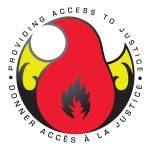In 2015, LAO supported Andrew Kingbird’s Aboriginal rights defence when he was charged with not having a life jacket on his motorboat. He sought to have the charge dismissed because the law infringed on his Aboriginal right to travel on the water for ceremonial purposes.
In keeping with the tradition of his people, and on the instruction of his Elder, Mr. Kingbird was collecting items for a shaking tent ceremony. Mr. Kingbird only carried with him what was necessary when he was on Rainy Lake, following specific guidance on how best to practice traditional mindfulness and respect while traveling upon the water for ceremonial purposes. This included clearing his boat of all items that would detract from this spiritual practice.
Under the law, however, there were no exceptions when it came to possessing a personal floatation device on board a vessel.
There have been several other similar instances where people were charged and convicted because they didn’t have the legal support to defend themselves.The issues raised in this case have a broad impact in the First Nation, Métis and Inuit communities—which aligns with the mandate of LAO’s Aboriginal Justice Strategy to improve legal services for Aboriginal people.
Quotes
“I grew up watching my Elders practicing their traditions, including the instruction not to carry unnecessary items with them while travelling upon nibi (water) for spiritual reasons.
When I embarked on my first fast, or vision quest, I was told that when I went out on nibi I should take nothing with me, except for the clothes on my back, my tobacco, my pipe, and other sacred items. This allowed me to be close to the spirits of the land and water, to the Creator itself.
My authority and knowledge as an Elder is founded upon my experience of intimacy with the Creator, and all my teachings flow from this foundation. This is why I guided Andrew Kingbird, and why I continue to guide others, to develop this closeness by being on the land, and travelling on nibi, unencumbered by things, possessions, tools, or conveniences that are not necessary to, and even interfere with, the purpose of their journeys.
In this case, Anishinaabe law was upheld. In the future, the OPP and MNR should consult with Aboriginal law-holders and include traditional laws and aboriginal practices as part of their investigation before proceeding with any charges.”
— Elder PaShawOneeBinace Ralph Johnson
 Aboriginal Justice Strategy
Aboriginal Justice Strategy